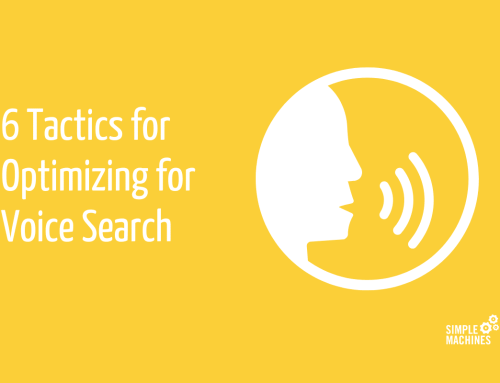Collectively, the Simple Machines team has read a lot of books about marketing.
We even have a book club where everyone can put in their order for a monthly Amazon book run — although we skip the part where we drink too much wine and talk about why everyone hates Morgan. (I’ve never been in a real book club but I’m assuming this is what happens. Poor Morgan.)
There are plenty of duds out there; some are unnecessarily long and should have just been articles, while others are barely disguised self-promotion.
But there are some marketing books that are absolutely worth reading if you’re looking to sharpen your craft.
Here are our current top five reading recommendations for small business marketers.
Predictably Irrational: The Hidden Forces That Shape Our Decisions by Dan Ariely
The central argument of Predictably Irrational is that traditional economists got it all wrong when they assumed that we live in a world of rational people acting in their own best interests.
In reality, the human decision-making process has next to nothing to do with rationality. Ariely, a Professor of Psychology and Behavioral Economics at Duke, supports his argument skillfully with ample evidence from his years of research studies and experiments.
If it sounds dry, it’s not. For one, Ariely is a great storyteller, which makes the book quick and enjoyable. It’s also entertaining to read about the ways in which people are consistently undermining themselves by procrastinating, overpaying and underestimating.
Understanding the actual forces driving our decisions is helpful both as a consumer and as a marketer — and it’s interesting to contemplate just how illogical most of us are when you stop to really examine human behavior. (Ever use a coupon to save twenty-five cents and then splurge on a night out without giving it a second thought? Yeah, me too.)
For a preview of the topics covered in the book — even if you don’t plan on reading the book — I recommend watching Ariely’s Ted Talk on the subject:
Influence: The Psychology of Persuasion by Robert Cialdini
Where Predictably Irrational establishes how people tend to make decisions, Robert Cialdini’s classic book on persuasion, Influence, provides a systematic framework for getting people to say “yes.”
I’m far from the first to recommend this this book. Since it was published in 1984, Influence has sold over three million copies, has been translated into 27 languages and continues to pop up on book recommendation and best-of lists to this day.
By the way, if reading that made you more likely to read the book, then you’ve been persuaded by one of the principles in Influence: social proof.
There are six principles covered in the book:
- Reciprocation
- Commitment & Consistency
- Social Proof
- Authority
- Liking
- Scarcity
If you’re in a marketing role, you probably intuitively know at least some of these principles, or you’ve picked them up by other means along the way. Even so, I consider this one to be required reading for marketers.
Sure, the marketing and advertising landscape has possibly changed in one or two ways since 1984, but the principles hold true today and having a mastery of them is a benefit to anyone in the profession.
Traction: Get a Grip on Your Business by Gino Wickman
Technically, Traction isn’t a marketing book so much as a playbook for leadership teams to run startups and small businesses using the Entrepreneurial Operating System® (EOS) approach. So, while I especially recommend this one if you happen to be in both a marketing and a leadership role, it’s still highly useful for marketing alone, in my opinion.
The book starts out with the stories of two business owners on very different pages — one with an operational focus, the other with a sales focus. Facing stagnation and struggling to even tread water, the two adopt the EOS methodology so they can regain control and get their company back on track for growth.
Through their story, the book illustrates how the tools of EOS (the accountability chart, the V/TO, the weekly “L10” meeting) align the leadership team around a shared vision and strategy and keep them moving toward the right goals.
At Simple Machines we use EOS for our own strategic planning, and we also put the tools into practice for many of our clients where the lines between marketing and strategic planning overlap.
If you get nothing else from the book, consider adopting the L10 weekly meeting for your marketing team. You’ll never go back to regular meetings again.
Good to Great: Why Some Companies Make the Leap… And Others Don’t by Jim Collins
Like Traction, Good to Great is a book with lessons for company leadership teams that apply quite directly to marketing professionals.
In Good to Great, Jim Collins and his team of researchers contrast the world’s greatest companies to competitors that failed to make similar leaps over the same time periods. In sifting through the data and interviews, the book serves as an analysis of why some companies make the leap and others don’t.
The findings include:
- Level 5 Leaders: The research team was shocked to discover the type of leadership required to achieve greatness.
- The Hedgehog Concept (Simplicity within the Three Circles): To go from good to great requires transcending the curse of competence.
- A Culture of Discipline: When you combine a culture of discipline with an ethic of entrepreneurship, you get the magical alchemy of great results.
- Technology Accelerators: Good-to-great companies think differently about the role of technology.
- The Flywheel and the Doom Loop: Those who launch radical change programs and wrenching restructurings will almost certainly fail to make the leap.
When you consider the findings and key concepts through the lens of marketing, most of them are still relevant. If you’ve ever grappled with questions about how often and to what extent brands or strategies should change course or what role technology should play in driving marketing, you’ll find use useful context in Good to Great.
Obviously Awesome: How to Nail Product Positioning So Customers Get It, Buy It, Love It by April Dunford
We saw April Dunford give a talk at HubSpot’s Inbound conference a few years ago, and I thought it was one of the standout sessions of the week. While a majority of talks that year centered around the topics du jour — bots, AI, AR — April talked about something that doesn’t get covered nearly as much in the shiny object, tactic-obsessed marketing world: positioning.
In Obviously Awesome, Dunford delivers a recipe for how brands can stand out in a crowded marketplace using smart product positioning.
The lessons in the book include:
- The five components of effective positioning
- How to instantly connect an audience to your offering’s value
- How to choose the best market for your products
- Three distinct styles of positioning and how to use them to your advantage
- How to leverage market trends to help buyers understand why making a purchase is important right now
While her experience as a startup executive and consultant skews SaaS, there are plenty of applicable concepts for marketers and business leaders across industries who are working to differentiate their products or services.
Have any books we should consider adding to our list? Let us know!

















